
I've already covered strategies for the civilizations that have been added or explicitly changed in the Brave New World expansion and its major fall (2013) patch. Now I'm going to move on to other legacy civilizations that have not had explicit changes, but who may have had their strategies significantly altered by the expansions and other updates. This time, I will be covering one civ that surprisingly does not benefit from Brave New World's new mechanics as much as one might think: the Roman Empire.
Rome is one of the most influential and heavily romanticized cultures of the classical world. The early Roman republic was a system of semi-democratic representational government. Power was divided between two consuls who were annually elected by the citizens and alternated as military leaders to check each others' ambitions, while an appointed body of senators directed foreign policy and enacted laws. The city gradually expanded its power and influence in the second half of the first millennium BC through the overwhelming success of its legionary forces and defeat of its primary rival Carthage, until it eventually came to control almost the entire Mediterranean. Rome itself became the center of government and commerce for most of Europe, and it established an elaborate network of roads, aqueducts, and other engineering feats.
The Roman government was generally very tolerant of foreign religions and cultures, which helped to pacify subjugated peoples. But as Rome became an empire, and its holdings expanded, this tolerance became a liability. Foreign peoples were allowed admittance into the army in order to secure Rome's ever-increasing borders, which lead to a decline in loyalty to Rome as the army became more diverse and less centralized. Eventually, generals would begin competing with each other for control of Rome and the title of emperor, weakening the empire from within and making it vulnerable to external threats such as immigrating Germanic tribes displaced by the Huns. Eventually, these threats would culminate in the sacking of Rome by the Visigothic leader Alaric in August of 410 AD, and the collapse of the Western Roman Empire. However, the eastern half of the empire, also known as the Byzantine Empire, would continue to carry the torch of Rome for another thousand years.
After the death of Julius Caesar, his adopted nephew and heir, Gaius Octavius, along with Marc Antony and Marcus Lepidus, tracked down and defeated Brutus, Cassius, and the other assassins who had conspired against Caesar. This new triumvirate quickly disintigrated into civil war, with Octavius decisively defeating both Lepidus and then Antony and holding sole authority over a new Roman Empire. He changed his name to Caesar in honor of his adopted uncle, and reinstated the Roman senate as a puppet facade government to legitimize his dictatorial leadership. He was extremely popular among the Roman citizens due to his relation to Julius, and was eventually honored with the title Augustus. He instituted numerous domestic reform including official police and fire-fighting services, engineering projects such as roads, and expanded the dominion of Rome in Africa, Hispania, and Germania. Octavius found Rome a city of bricks; Augustus left it a city of marble, and the envy of the western world.
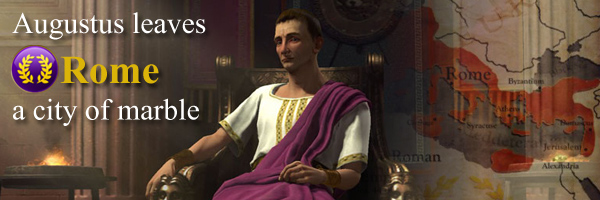
Roman uniques in Civilization V: Brave New World

Rome is an expansive empire that excels at infrastructure and early-game conquest. Its pair of unique units have a narrow window of opportunity and must be used quickly before they become obsolete.
The Glory of Rome
"+25% Production towards any buildings that already exist in the capital."

The Romans should put a strong priority on building newly-unlocked buildings in its capital as soon as possible. Doing so allows subsequent cities to benefit from faster production of those same buildings. This helps newly-founded cities to get off to an early start, and Rome's ability becomes more powerful as Rome founds (or conquers) additional cities, since these new cities can more quickly construct the essential infrastructure that surely already exists in the capital. Hopefully, your capital has really good early production so that it can get its monument, shrine, library, market, and so on built quickly enough for your second and third cities to benefit from faster production.
Since the extra production from trade routes is added after all percentage bonuses have been applied to a city's base production, Rome's production trade routes do not benefit from the Glory of Rome ability! You won't get any extra production out of trade routes that are sending production to cities that build buildings that already exist in the capital. It's sad, but true.
The production bonus from Glory of Rome might make internal trade routes unnecessary in all but the most un-productive of cities. By sending multiple production routes to Rome, you can ensure that Rome gets newly-unlocked buildings constructed quickly so that other cities can benefit from the production bonus to build these buildings as soon as possible. Alternatively, if you have lucrative foreign trade routes available, use the excess gold to buy newly-unlocked buildings in Rome so that you can immediately receive the production bonus for these buildings in other cities.
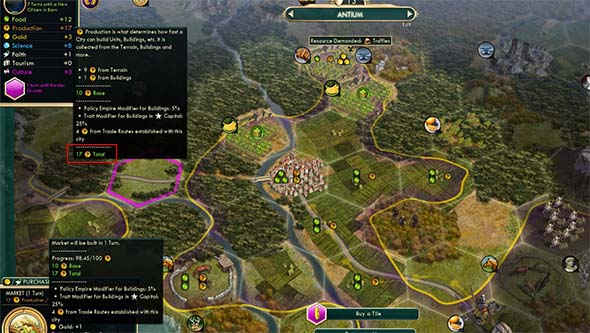
Trade route production is not multiplied by Glory of Rome.
So looking at the above example of Antium, we have base 9 production from terrain and 1 production from the Water Mill building. We have a 5% bonus for the Republic social policy and the 25% bonus from the Glory of Rome. And then there's the 4 bonus production from an internal trade route. We can verify that trade routes aren't buffed by Glory of Rome with the following maths:
Hypothetical yield (Glory of Rome applies to trade route):
(terrain + buildings + trade route) * (republic + Glory of Rome) =
(9 + 1 + 4 ) * (1 + 0.05 + 0.25) =
14 * 1.30 =
18.2 total production
Actual yield (Glory of Rome does not apply to trade route):
((terrain + buildings) * (Republic + Glory of Rome)) + trade route =
((9 + 1) * (1 + 0.05 + 0.25)) + 4 =
(10 * 1.30) + 4 =
13 + 4 =
17 total production
And you thought you'd never use math in your personal life...
India benefited tremendously from the new trade route mechanic in Brave New World, but Rome got the short end of the stick on this one... On the upside, the Glory of Rome ability does work in puppeted cities, and trade routes can still play a vital role in optimizing Rome's special ability.
There is an indirect downside to Glory of Rome: building all those buildings so quickly can easily put strain on your economy as maintenance costs can quickly skyrocket, especially if you expand rapidly. Keeping a steady supply of gold is, therefore, important for Rome. Plan your expansion so that you obtain gold-generating resources (which will also help with happiness) and / or easily-accessible, highly profitable trade routes.
Carry-over production from the previous turn is modified by Glory of Rome when applicable. If your current build project qualifies for Glory of Rome, the production carried over from last turn will be modified. However, bonus production from forest chopping is not modified by Glory of Rome. Lastly, Glory of Rome is not tied explicitly to the original capital. If Rome ever loses its capital, it will continue to receive the benefit of Glory of Rome using its new capital as the basis for the production boost.
Legion
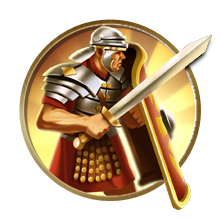
Game Info: "Strong, front-line land unit of the Classical Era. Only the Romans may build it. This unit has a higher Combat Strength than the Swordsman, which it replaces."
Civilopedia Strategy: "The Legion is the Roman unique unit, replacing the Swordsman. The Legion is more powerful than the Swordsman, making it the most powerful melee unit of the Classical Era. The Legion can also construct roads and forts and is the only non-Worker unit able to do so."
Replaces: Swordsman.
Requirements: Iron Working, and standard unit maintenance (same as Swordsman).
Obsoleted: Gunpowder technology, Upgrades to: Longswordsman (same as Swordsman).
Cost: 75 Production | 150 Faith | 270 Gold (same as Swordsman).
Attack Type: Melee, Combat Class: melee, Combat Strength: 17 (+3 from Swordsman).
Movement Speed: 2 (same as Swordsman).
Bonus(es): can build roads and forts.
The legion has substantially stronger combat strength than other swordsmen, and this higher strength even makes them a bit more competitive against longswordsmen. Since this bonus is in raw combat strength (rather than a promotion), it does not carry over when the unit is upgraded. The window of opportunity is very limited, and the legion must be used before this window closes.
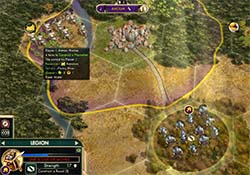
Assign your legions to build your roads
while workers improve resources
Fortunately, this unit has peace-time functions as well. If you aren't using it for war, then you can use it during its narrow window of usefulness to supplement your workers and help build your early road networks. Instead of garrissoning your legions in cities, use any defensive legions to build roads between your cities while your actual workers focus on building other tile improvements. With all this extra manpower, the Roman countryside should be improved and all its cities connected much earlier than any other civilization.
Even if your legions are going to war, their road-building power is still useful. Prior to war, you can build roads leading to the front lines using your mobilizing legions. Or after capturing a city, you can quickly turn your legions around and build a road back to your territory without having to bring a worker along with your army. Even during combat, you can assign your reserve legions to build roads while your front-line legions hammer on the enemy, then switch them out when the front-liners get too damaged. Just be careful that you don't overbuild roads, since you will have to pay maintenance on any roads that you build in neutral territory.
Lastly, the legion can also build forts. So if you don't have any roads to build, then you can use any defensive legions to build some border forts near hostile neighbors. You can't build forts in enemy territory though.
The legion has a few notable limitations:
- Legions cannot repair pillaged roads or forts, but they can build new ones to replace the pillaged ones (effectively the same thing, but it takes longer),
- Legions cannot build forts in enemy territory,
- Stacked legions and workers cannot improve the same tile on the same turn, even if they are building different improvements (so your legion can't build a road while a worker builds a farm on the same tile).
Ballista

Game Info: "Siege unit that does major damage from a distance, but must set up prior to firing. Only the Romans may build it. This unit has a higher range strength than the Catapult, which it replaces."
Civilopedia Strategy: "Roman unique unit, more powerful than the Catapult it replaces. The Ballista is an excellent siege weapon. It is extremely useful against cities, but it is quite vulnerable to attack. Be sure to protect the Ballista with other military units. The Ballista must first set up (1 MP) before attacking."
Replaces: Catapult.
Requirements: Mathematics, and standard unit maintenance (same as Catapult).
Obsoleted: Physics technology, Upgrades to: Trebuchet (same as Catapult).
Cost: 75 Production | 150 Faith | 270 Gold (same as Catapult).
Attack Type: Ranged, Combat Class: Siege Weapon, Combat Strength: 8 (+1 from Catapult).
Ranged Strength: 10 (+2 from Catapult), Range: 2 (same as Catapult).
Movement Speed: 2 (same as Catapult).
Bonuses: 200 bonus versus cities (same as Catapult).
Penalties: Must set up prior to attacking, may not melee attack, no defensive terrain bonus, limited visibility (all same as Catapult).
Originally, when vanilla Civ V launched, Catapults and Ballista required iron to build. In patches, this requirement was removed.
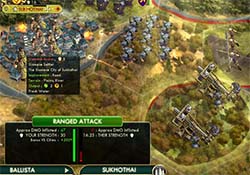
Ballistae don't need the Siege promotion
to be effective against early cities.
The ballista's only bonus is its increased raw combat strength. It is more powerful in both its ranged attack power and its defensive strength. It is a powerful city-sieging machine early in the game (being almost as strong as a trebuchet). Their base ranged strength is almost as good as a composite bow, which means that the ballista can also be an effective anti-unit weapon, and can be garrisoned in cities for defense.
Like the legion, its strength increase does not carry-over when upgraded to the trebuchet, so it has the same narrow window of opportunity that the legion has. Try to use it while you can.
Strategies for Making the World Behold the Glory of Rome
Once you get your local luxury resource improvement techs researched, you should put very high priority on Bronze Working in order to find and secure an early source of iron. It doesn't have to be a lot of iron, just something to get you going. Assuming that you find some iron, you should make efforts to settle near it and improve it as quickly as you can while you research Iron Working and then move onto Mathematics in order to unlock your other unique unit. If you don't have any accessible iron near you, then skip Iron Working for now and just go for Math. You can then use your ballistae to conquer a nearby civ or city state that does have iron.
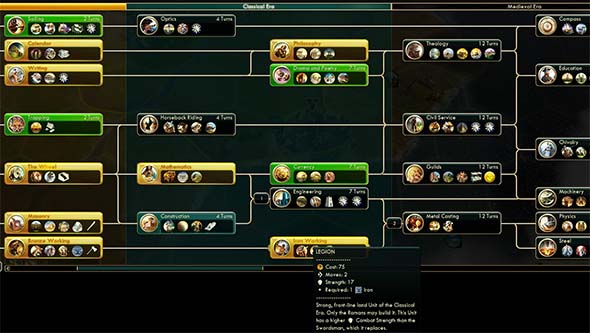
Roman tech priorities should include Iron Working (for the Legion), Mathematics (for the Ballista),
and Metal Casting (for the Workshops to allow shipping production between cities).
Rome is one of the few civilizations that is well-suited to the Liberty policy tree and rapid expansion. But only if you have access to gold-generating resources! Otherwise, you may go bankrupt from maintenance without the bonus gold from Tradition's Monarchy policy. The Citizenship policy will grant a free worker and buff worker production speed. This buff will also apply to the road and fort-building powers of your legions (but this doesn't make a difference on normal game speed or faster). The Pyramids can also be worthwhile to pursue, since it will further buff your worker and legion productivity enough to make a noticeable difference even on standard game speed. With the three free workers for improving your terrain and legions for building roads, Rome may not need to invest a single point of production into workers for the first half of the game, which is good, because it means your capital can focus on popping out as many buildings and units as your economy can afford.
That being said, on higher difficulties, a smaller, Tradition-based empire is still a safer bet. The growth bonuses that Tradition policies provide will allow Rome to work more tiles (including highly-productive tiles) that will allow them to even further speed up building construction and allow cities to produce more units, wonders, and so on.

While you still only have two cities, you should invest in barracks so that you can finish your Heroic Epic soon enough to give its bonus to some of your legions. Having a handful of early legions and ballistae will make Rome into a military powerhouse at the start of the game. Rome's early unique units also means that adopting some Honor policies early in the game can also pay off.
Regardless of your end-game strategy, you should try to use your unique units to conquer a neighbor if you can - especially if your neighbor is Montezuma, Catherine, Shaka, or some other civ that will certainly turn on you at some point. Your unique units don't retain any of their enhancements when upgraded, so you have to use them during their window of opportunity! Doing this early enough - before you've met many other civs - will avoid the drastic warmonger penalties of conquering another civ's capital. This will allow you to forge meaningful trade relations and alliances later in the game and remain competitive for non-domination victories.
The road-building speed of Roman Legions is buffed by Liberty's Citizenship policy and the Pyramids.
Once you have your army set up, it's time to start looking to expand your empire through settling new lands. Take the Collective Rule policy if you haven't already and start building settlers. Escort them with one or more legions until they found their city, then use the legion to start building a road back towards your capital. If you have other workers or legions building roads out from your capital, then they can meet halfway. Alternatively, if you're in no hurry to get your settler to its destination (if you're waiting to build your National College, for example), then have your legion build the road as you go so that your city is connected to the trade route as soon as its founded. Just make sure you have enough gold income to support these extra roads.
Making Rome a city of Marble

One indirect benefit of Glory of Rome is that faster production time for buildings means that you can potentially meet the prerequisites for your national wonders more quickly. Founding an extra city or two doesn't push back your ability to build the National College or Epics as much as it might with other civs. Just be sure that your first few cities have decent base production because 25% increase over nothing is still nothing.
After you have your uniques unlocked, you should then focus your tech progression towards Metal Casting. This will unlock Workshops that will drastically improve your productivity and allow for you to start shipping production between your cities. On the way to Metal Casting, you'll also go through Construction, which will allow you to start building Coloseums in order to maintain your empire's happiness after any early-game conquests or Liberty-fueled rapid expansion. Horseback Riding can be useful for the Circus Maximus and Circus if you are still low on happiness. Lastly, the Meritocracy policy in Liberty (or Monarchy if you went the Tradition route) will help with maintaining happiness, since your legions should allow you to quickly establish connections between newly-settled and newly-conquered cities.
In the meantime, use internal routes to send food to your newer cities in order to increase their population. This is especially useful if you have productive tiles like mines. Sending food to your cities will allow them to grow while also working productive tiles (the yield of which will be boosted by Glory of Rome).
Once your cities all have enough population to work their productive tiles, you have two choices with your trade routes:
- Send production routes to Rome to quickly construct buildings to use Glory of Rome in other cities,
- Focus on international trade, and spend money to buy buildings in Rome.
If there aren't many safe, lucrative international routes available (i.e. if you've killed all your neighbors or don't want to send trade routes into hostile territory), then you can devote your internal trade routes to sending production to your capital. This will allow Rome to rapidly construct important newly-unlocked buildings so that your other cities can use the Glory of Rome power towards that building sooner rather than later. While you wait for these buildings to be finished in Rome, dedicate your other cities to catching up on older buildings, or use them to pop out some units or wonders.

If you were able to keep peaceful relations with some neighbors and have access to some highly-profitable international trade routes, then the better option is to focus on generating as much gold as possible. Save up your gold so that when you hit technologies that unlock key buildings (like universities or factories), you can simply buy the building in Rome outright. This will allow you to instantly start applying Glory of Rome towards these buildings in your other cities without having to wait for Rome to produce them. This gets those key buildings constructed sooner in all cities so that their effects can start accumulating earlier. Since you're buying core economic buildings in Rome, you can spend the city's actual production on units, wonders, or archaeologists.
In either case, you'll still want to dedicate a trade route or two to sending food and/or production to any newly-founded or newly-conquered cities in order to establish them quickly. You can also take a hybrid approach if you go for an early religion. Taking the Tithe (or other gold-generating) belief can keep a healthy supply of gold in your treasury. Your gold reserves can be further augmented by using your strong military units to bully any city states that you can't (or don't want to) become friends with. Excess horses and luxuries can also be sold to other leaders.
If you did take the religious route, then other beliefs to look at are Guruship and Religious Community. The production generated by these beliefs is enhanced by Glory of Rome. The Jesuit Education reformation belief will allow you to buy late-game education buildings with faith rather, allowing you to spend your gold for things like factories, broadcast towers, and hotels instead.

If you can generate a large surplus of gold from sources other than trade routes, then you can still afford to buy buildings in the capital while also using trade routes to generate additional production in your cities (even though it won't be buffed by Glory of Rome), or pump excess food into your cities in order to feed specialists as the game goes on. Later in the game, adopting Commerce to build Big Ben and / or adopting Order's Skyscrapers tenet will provide a sizeable discount on building gold costs that will help make this approach easier.
Legions do not go obsolete at steel, and they can be useful for defense or building roads to city states.
It's also worth noting that the Legion does not become obsolete with Steel. It becomes obsolete with Gunpowder instead. This means that you can still produce legions even while you are using longswords. Why would you want to do this? They're cheaper to build and still make for decent defensive units. Upgrade your promoted legions to longswords and build new legions to act as defensive units and "combat engineers" for your newer cities. This spares you from having to train pikes or crossbows to defend your workers if you still need to build road networks. This is especially useful if your early aggression have made you a target of other civs' ire, and a backstab could come at any moment. Legions are also great for completing the "build a road to city state" quests, if any CSs offer that quest. You don't have to build extra units to defend them from barbarians or other hostile players, nor do you have to take your own worker(s) away from improving your own territory. You can even consider gifting the legion to the city state for an added boost in influence.
Making Rome a city of steam and iron
As you move into the mid-game and get workshops built in all your cities, you might want to consider building your Iron Works national wonder in a city other than your capital. This will allow that building's production to be augmented by the Glory of Rome ability. This is especially true if you plan on buying buildings in the capital rather than building them. Assigning worker specialists will also provide a slight boost to production (remember, fractional production does count!).
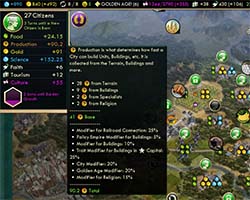
A railroad network will further buff
Glory of Rome's productivity.
Rome should be able to create and maintain a well-developed road network in the first half of the game. Going into the later stages, Rome should also put priority on upgrading that road network into a rail network. Connecting your cities via rail will provide an additional 20% boost to production in those cities. This 20% bonus does stack with the 25% bonus of Glory of Rome, leading to a total 45% production bonus for late-game cities building something that already exists in the capital! Coastal cities with a harbor connection to the capital gets this bonus without needing any rail lines connecting it. Prioritize connecting the capital to a coastal city with a harbor if it is not already coastal.
With this large production bonus, your cities can rapidly produce the valuable, late-game buildings like Public Schools, Hospital, and Factories (if you don't already have them). It will also help towards some of the victory-specific buildings like the Broadcast Towers and Hotels that are integral to the cultural victory, and the Research Labs that can contribute to a science victory.
Releasing the Visigoth within you - Countering Augustus' Rome
Rome isn't a particularly difficult civilization to defeat in open conflict, as long as you don't get caught up in conflict with them at the peak of their unique units' window of effectiveness. Once longswords and trebuchets have become common place, Rome's military advantages are reduced to whatever promotions their legions and ballistae had already acquired, so they can be treated as any militaristic civilization, but without any additional military benefits. The only difference is that you may need to take extra precautions against their ability to rapidly mobilize forces over their extensive road network, and the possibility of their defensive units holing up in forts.
Without early access to iron, Rome is not nearly as much of a military threat. He won't be able to build Legions, and without the protection of Legions, the Ballistae will be much more vulnerable. If you can deny Rome access to iron up until you can start producing medieval units of your own, then you will completely bypass their classical unique units.
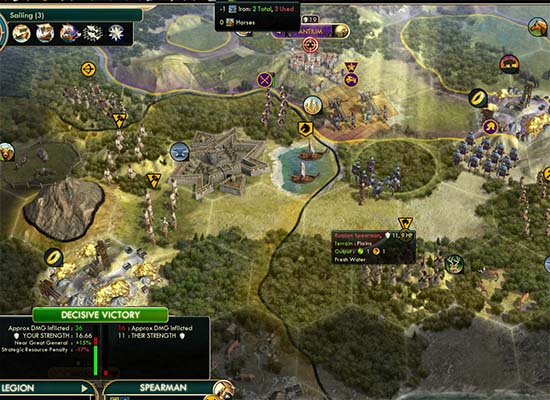
Denying Rome access to iron until medieval era almost completely neutralizes them as a classical military threat.
Rome can be a little bit more challenging to beat economically. Their production bonuses means that they should have multiple, highly productive cities earlier than many other civilizations can achieve, as well as very well-improved terrain. The A.I. maybe doesn't focus on improving its terrain as much as it should, but Augustus does have a high overall rating for tile improvement. So in addition to having a lot of infrastructure within cities, Rome will likely also have well-developed infrastructure around their cities. They won't necessarily have all the population to work these improved tiles until later in the game, but their lands should be ripe for pillaging or conquest if you feel so inclined.
Augustus' A.I. is one of the least trustworthy in the game. Avoid trading with him if you can. Send your trade routes to other civs or city states when possible, and try to get your resources from other civs or city state allies. This will have the added benefit of limiting his economic growth, which may make it difficult for him to pay the upkeep for a large army and extensive infrastructure. It can be difficult to build any kind of meaningful relationship with Augustus, and even if you do, he will attack you if he feels he has a stronger military. He can turn on you at any moment. His military might is generally hit-or-miss. If he does well early on, he can become a military run-away, but he's also just as likely to get smacked down by other, more aggressive foes - especially if the timing of his wars is not to his advantage.

Augustus is generally more interested in his own cuticles than in maintaining amicable relations.
He is, however, fairly tolerant of warmongers. So if you are playing a highly aggressive game, with a military as good or better than Rome's, then he can be a decent ally or trade partner. You can delay an attack on Rome until after you've dealt with other, bigger threats (like Zulu, Poland, Russia, Greece, or the Iroquois), and after their Legions and Ballistae have become obsolete.
Discuss this strategy on Civfanatics:
http://forums.civfanatics.com/showthread.php?t=553070
or on the official 2K Civilization V forums:
http://forums.2k.com/showthread.php?
3326381-A-general-strategy-for-Rome-BNW
Listen to the discussion on PolyCast, Episode 247, 05m56s (January 30th, 2016):
http://civcomm.civfanatics.com/polycast/polycast/season10/episode247.mp3